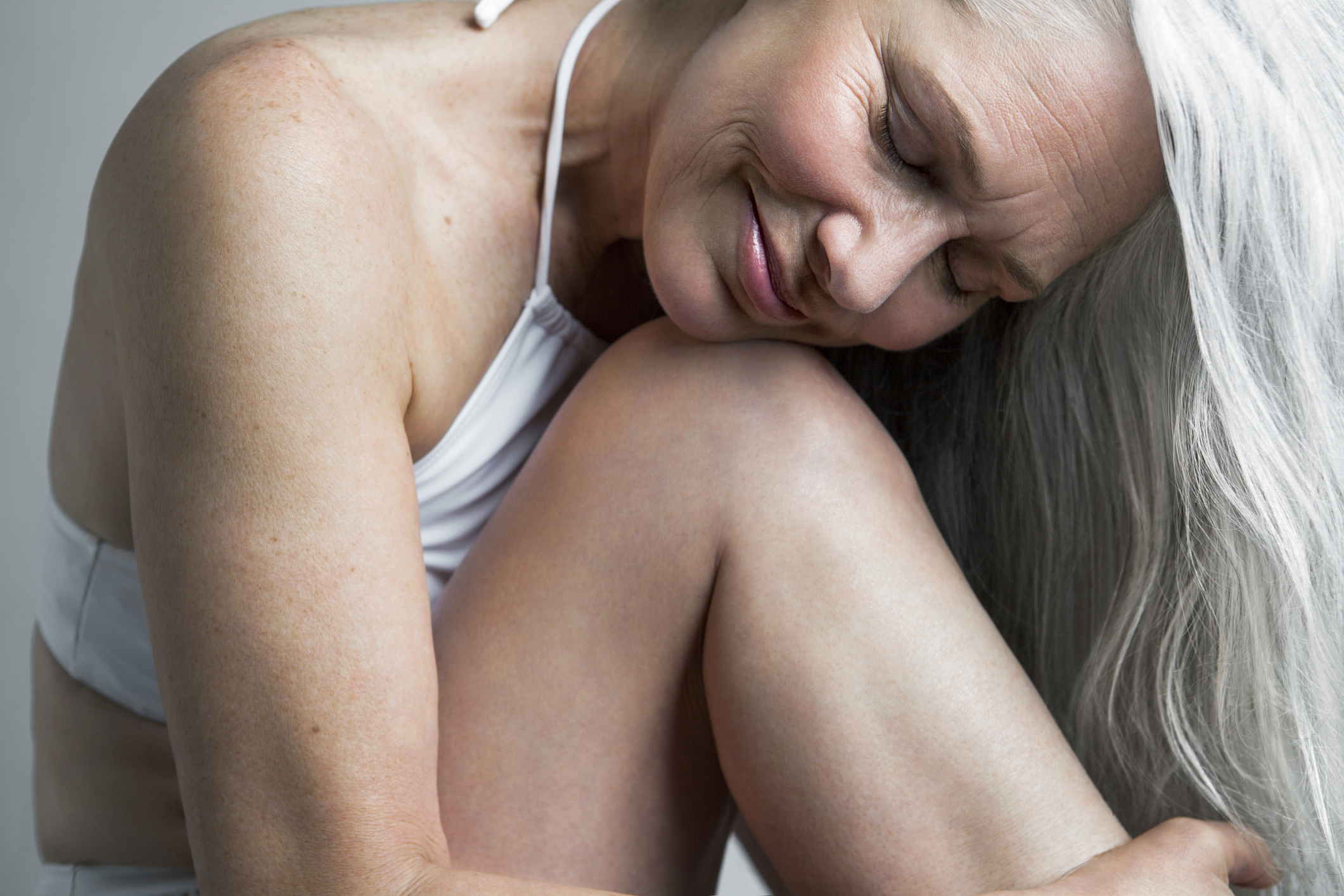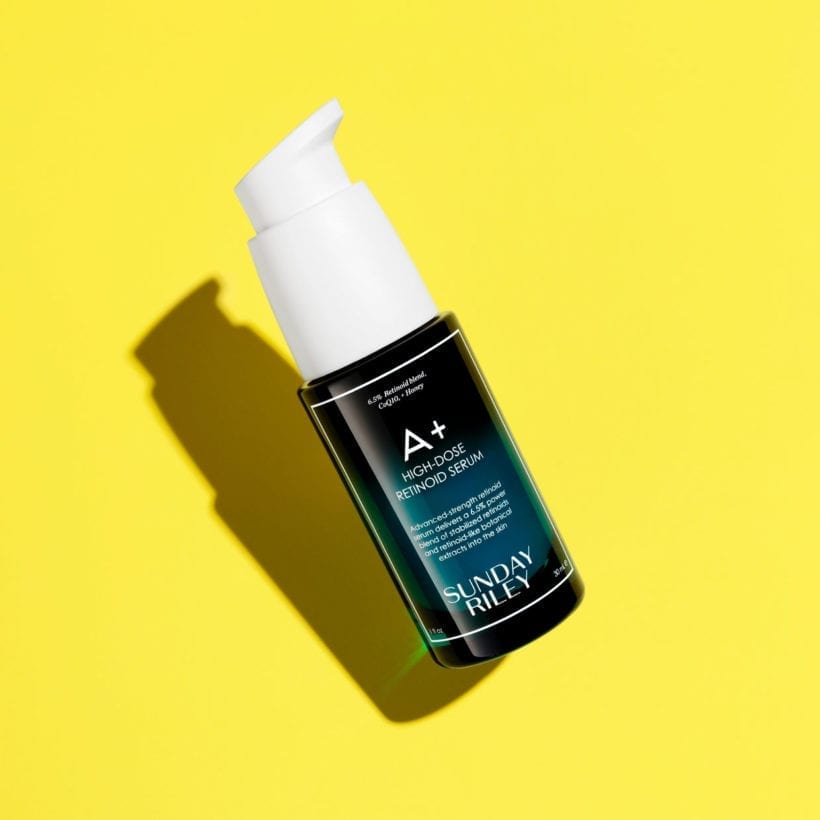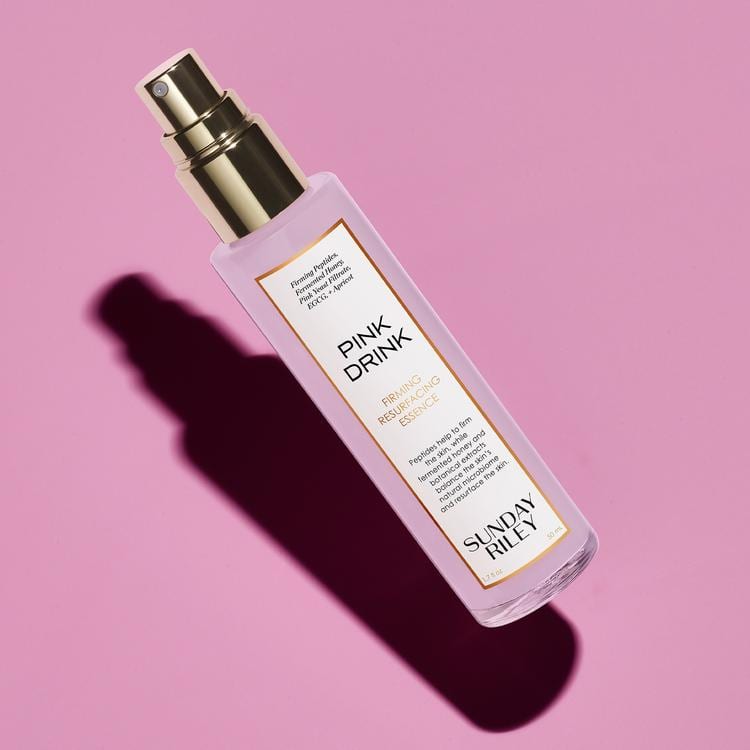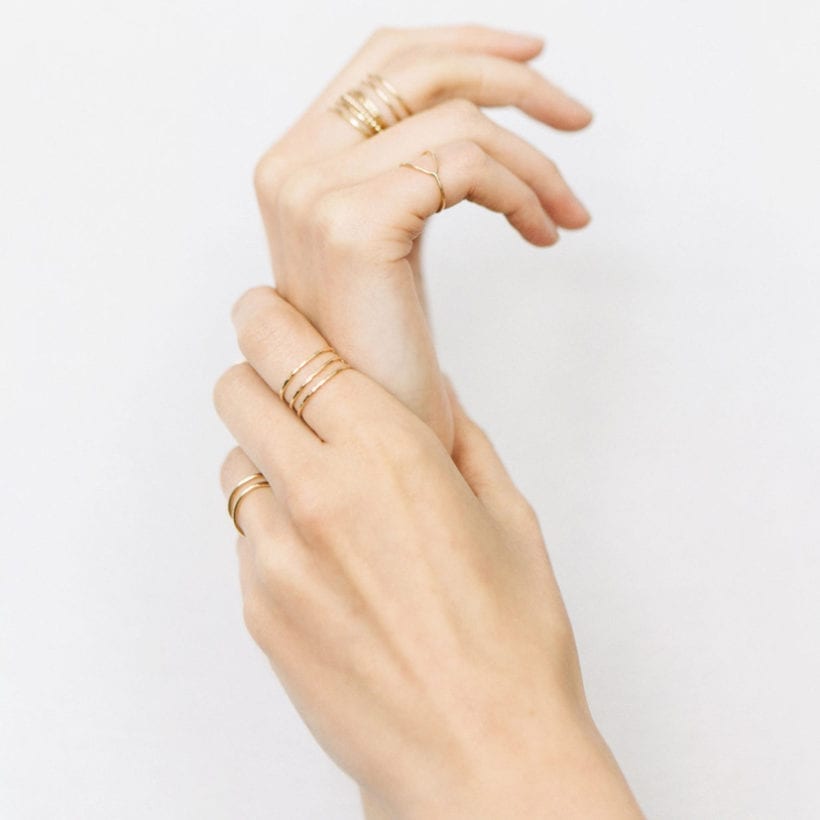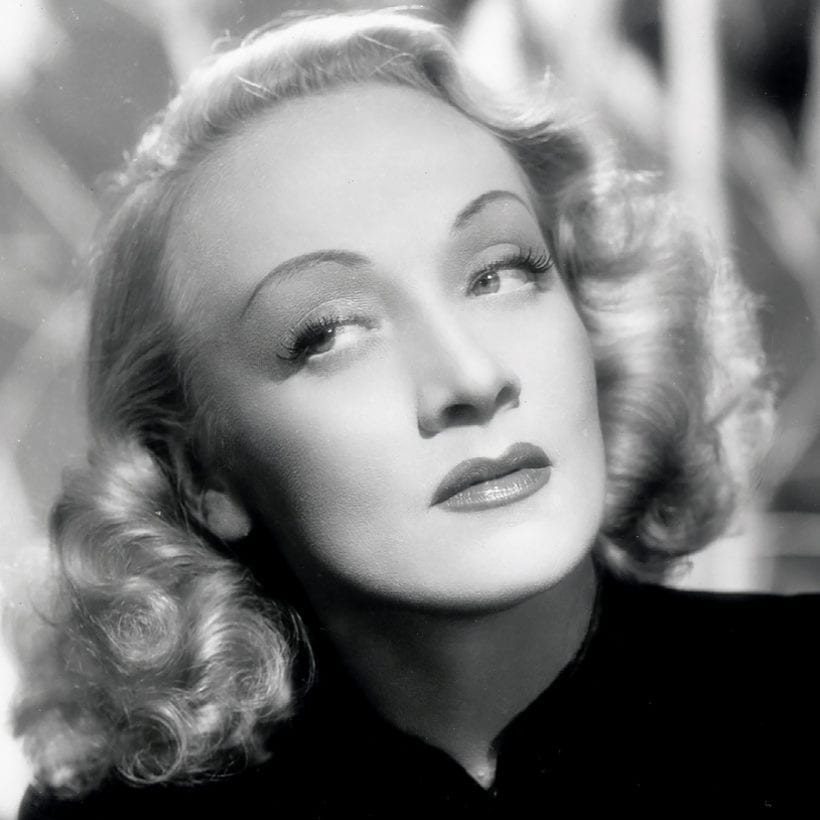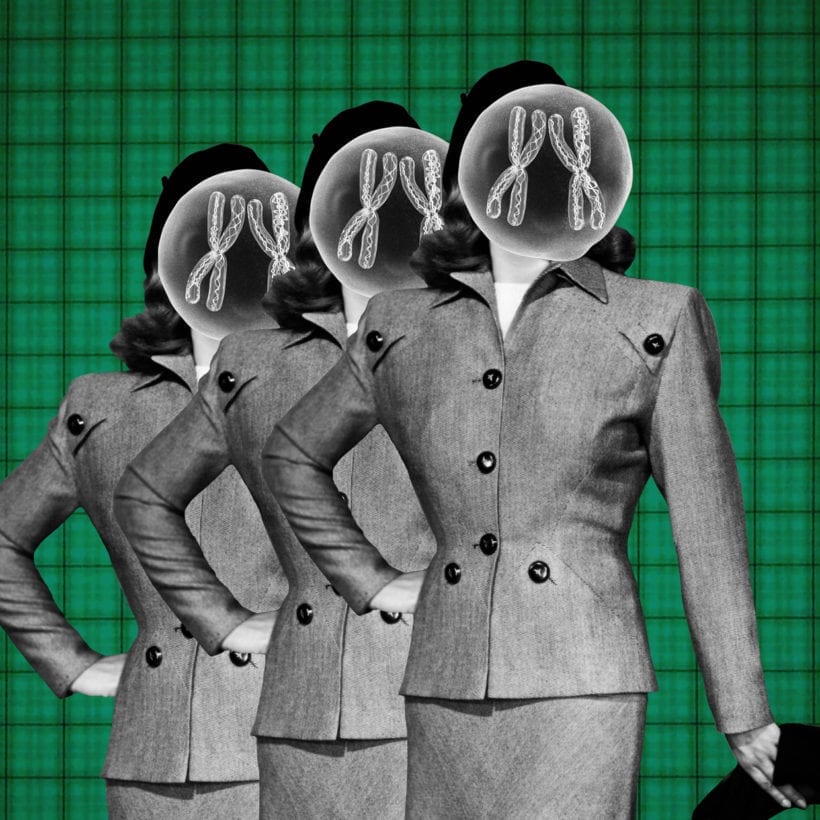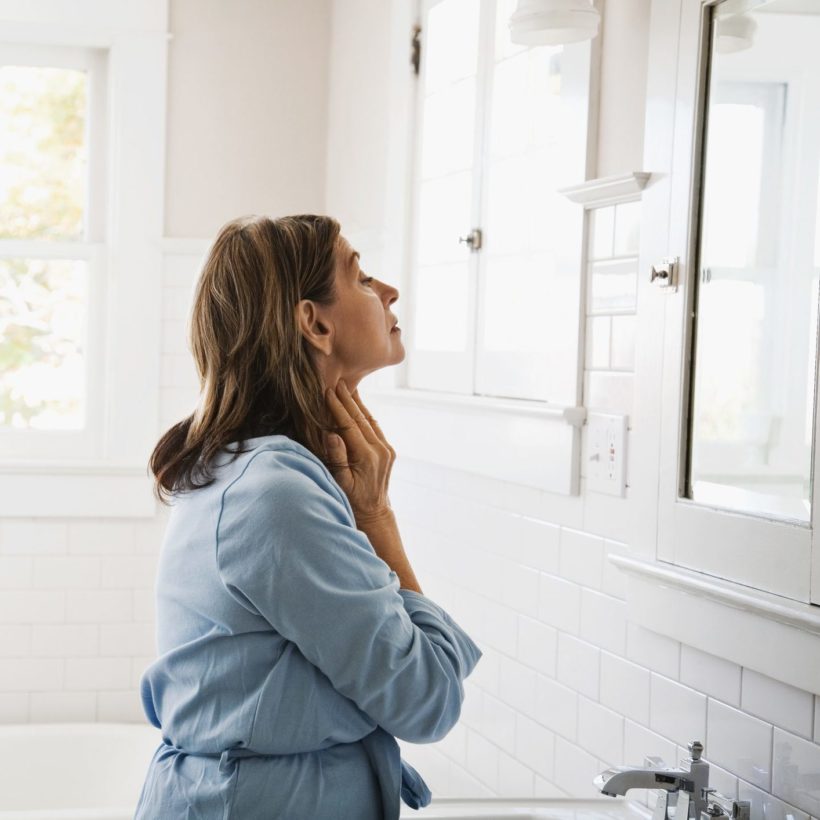Everyone with ovaries will experience menopause one day, and yet it’s rarely talked about outside of doctor’s offices and quiet conversations between friends. Changes in hormones during menopause — which typically occurs between the ages of 40 and 60 with an average age of 51 — can cause all kinds of symptoms, from hot flashes to mood swings, hair and brow loss, and so much more.
“The rapid drop in estrogen that occurs during perimenopause is a significant contributor to skin aging,” Dr. Hadley King, a dermatologist, says. In fact, collagen drops 30% in the first five years of menopause, then another 2% each year for the next 20 or so years. King adds that this can lead to fine lines and wrinkles; in addition to extremely dry skin, many women will also experience acne as estrogen levels fall and androgens rise, increasing sebum production.
Plus, there can be sexual side effects of menopause due to decreasing estrogen; OB/GYN and founder of Mommy Matters, Dr. Taraneh Shirazian adds that “menopause may cause vaginal dryness and painful sex.”
The brands on this list are making skin, vaginal, and body care specifically for menopausal women, and they’re more than just anti-aging products couched in a different label.
State Of
Fashion and style consultant Stacy London (who you may have seen on What Not To Wear, Today, Access Hollywood and more) describes feeling “bat shit crazy” when she went through menopause. Between itchy, dry skin, acne, intense emotions, and moments of brain fog like forgetting certain common words, London started State Of to break the silence and shame surrounding menopause. As the State Of website says, “we’re not your mother’s menopause company because she didn’t have one.”
The line includes a cooling spray and cooling moisturizer, two separate supplements to fight inflammation (one is made with evening primrose, the other with turmeric), arnica hand and joint cream to help relieve aches, a CBD balm to relieve breast tenderness, and so much more. The products are ethically and sustainably sourced and free of parabens, sulfates, phthalates, and synthetic dyes and fragrances.
Suki
Suki Skincare recently launched a trio of products called Suki Era, specifically designed for perimenopausal and menopausal women. The trio includes an ultra-hydrating moisturizer rich in polysaccharides for increasing microcirculation and firming the skin, plus beech tree bud extract that can help build collagen and elastin. Suki also has a hydrating facial oil made using lipid youth complex — a blend of active ingredients including squalane, jojoba oil, and macadamia seed oil esters, plus a natural retinol replacement, bakuchiol, which helps minimize the appearance of wrinkles. Perfect for hot flashes, Suki Era’s Reviving Cooling Spray cools the skin on contact, thanks to Frescolat MGA (a natural alternative to menthol). It also has betaine, which is deeply moisturizing.
LaMaria
LaMaria was created by OB/GYN, Dr. Manuela Maria Vazquez, specifically for women experiencing hormonal changes that happen post-30, including menopause.
The brand only includes two products: a feminine (read: vaginal) moisturizer, and a facial moisturizer, which both contain phytoestrogens; phytoestrogens are plant-based ingredients that can mimic estrogen and help the body naturally produce collagen, hyaluronic acid, and elastin.
The feminine moisturizer helps address vaginal dryness (one study found that 34% of post-menopausal women report vaginal dryness). It’s not overly sticky or slippery, and unlike other lubricants, it’s made using clean ingredients. The packaging feels more spa-like than medical, something you’d be proud to showcase in your bathroom.
Caire
Caire Beauty, founded by Celeste Lee and Lorrie King, has created what the brand calls Defiance Science; their products are formulated to defy the effects of hormonal changes before and during menopause. Their streamlined products include just a serum and a mask that boost the skin’s ability to hold onto hyaluronic acid (hyaluronic acid, which helps the skin retain water, begins to decline around age 30, then more rapidly in menopause). While their formulas are largely proprietary, the products infuse molecules into the skin and spur the body to make new skin cells.
Lee and King, along with their two science partners, own Caire Beauty Labs, which means they can take their time to perfect each formula because they aren’t beholden to a third-party lab or timeline.
Better Not Younger
Skin is not the only part of the body affected by menopause. Hair can also change texture due to hormonal changes, and some women will experience hair loss during this time in their life. Proving that youthfulness is not synonymous with “more beautiful,” Better Not Younger addresses the needs of aging hair by creating an efficacious haircare line for women over 40.
Each product is formulated to address a particular hair, scalp, or internal health need associated with aging. There’s a fortifying hair and scalp serum, for example, a hair, skin, and nails supplement, volumizing shampoo and conditioner, or a brightening shampoo for gray hair, among many other products.
If you’re not quite sure what your hair needs, but you know it needs something, there’s also a handy hair quiz on the Better Not Younger website, which will select the correct products for your hair. The brand uses a blend of high-quality natural and synthetic ingredients. Most of the products are vegan (except the collagen gummies), paraben and cruelty-free.
Kindra
Kindra carries a vaginal lotion plus an applicator and three different supplements (one to promote sound sleep, one for energy, and one, known as The Core, that addresses everything from hot flashes to brain fog, mood swings, and skin health). Their supplements are notable because they do not contain estrogen, as many supplemental menopausal products do. Risks of supplementing with estrogen (which happens during hormone replacement therapy) include risks of blood clots, an elevated risk of certain cancers, and dense breast tissue, which can make breast cancer harder to detect on a mammogram, per Healthline.
Like Better Not Younger, Kindra offers a straightforward quiz to hone on the products that will be most beneficial to you and your specific menopause side effects (whether that’s fatigue, weight gain, dryness, trouble sleeping, etc.). There’s also a community of women available to offer expertise, support, and encouragement through the Kindra Facebook group.
Emepelle
Emepelle is formulated specifically to address estrogen-deficient skin. The line, which contains a night cream and a serum (the most expensive products on the list at $195 and $175, respectively), came specifically recommended by Dr. King. “In addition to emollients, humectants, peptides, retinol, and antioxidants, the Emepelle products contain methyl estradiol propanoate, a non-hormonal way to activate the estrogen receptor,” King says. She adds that this non-hormonal version of estrogen effect is solely on the skin, so estrogen is not getting into the blood. “Once absorbed into the bloodstream, it is rapidly deactivated into an inactive metabolite, so there are no systemic side effects,” she adds.
How Can I Make Menopause More Manageable?
In addition to using a skin, hair, or ingestible product designed to meet the bodily needs of menopause, there are other things you can do to make this transition more bearable. “Practice sun-smart behaviors and don’t smoke to minimize skin aging coming from extrinsic factors,” Dr. King suggests. “Anti-aging topicals such as retinoids, anti-aging peptides, and alpha-hydroxy acids can all be helpful as well. Studies have shown, for example, that six months of topical glycolic acid stimulated a 27% increase in epidermal thickness,” she adds.
Some women and their doctors will decide that Hormone Replacement Therapy (HRT) may be beneficial. Dr. King says that some studies show that estrogens used in HRT can thicken the skin or increase collagen content, whether given orally, topically or transdermally. “ HRT also affects the skin’s ability to retain water and leads to a reduction in skin wrinkling. However, the numerous adverse effects of HRT, such as an increased incidence of cancer and cardiovascular morbidity, limit its use. The decision about whether or not HRT is right for you should involve a thorough and individualized assessment with your healthcare provider based on your specific health risks and concerns,” she says.
We only recommend products we have independently researched, tested, and loved. If you purchase a product found through our links, Sunday Edit may earn an affiliate commission.
